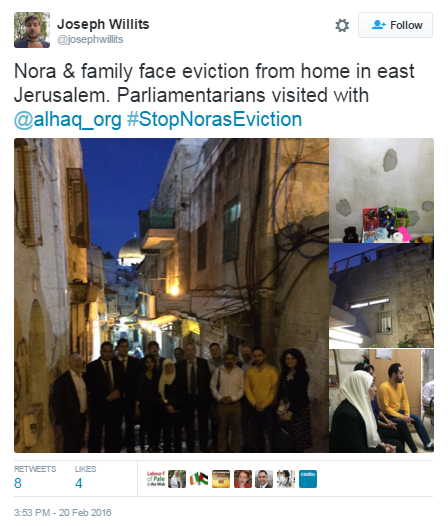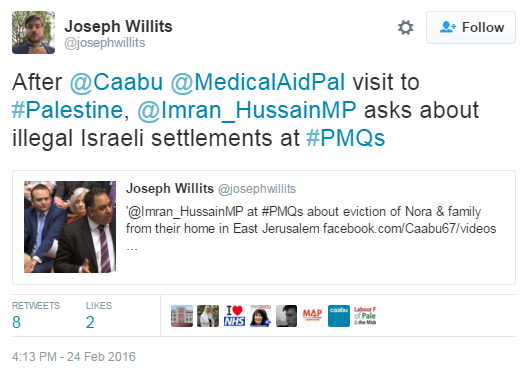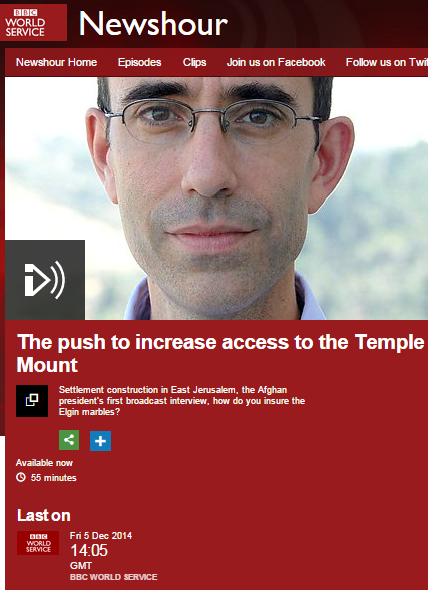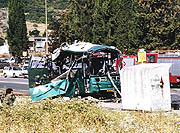Back in December we noted that our colleagues at CAMERA had secured corrections to inaccurate information appearing in an article published by Associated Press which was largely sourced from an employee of a political NGO previously quoted and promoted in BBC content.
“”They (Israelis) are trying to uproot us from Jerusalem, they are stealing the houses, the trees and the stones of the city,” laments Nura Sub-Laban, a Palestinian woman featured in The Associated Press article today by Karin Laub and Mohammed Daraghmeh (“Palestinian eviction case spotlights Jerusalem settler push“).
Set against the backdrop of the disputed “gold-topped Dome of the Rock,” AP’s account of the looming eviction of Sub-Laban from their home in Jerusalem’s Muslim Quarter reflects a narrative of supposed Jewish encroachment in the holy city at the expense of dispossessed Palestinians, blameless “victims of discriminatory use of Israeli property law.”
It is also fundamentally wrong, based as it is on a grossly misrepresented basic facts about the Sub-Laban case, initially ignoring critical essential information and falsely casting it as part “of a wider settlement campaign.””
The subject matter of that AP article cropped up again last week during Prime Minister’s Questions in the UK Parliament. The ‘BBC Parliament’ TV channel of course broadcast the February 24th session which included a question from the MP for Bradford East (available in the UK only from 29:22 here).
“Imran Hussain (Bradford East) (Lab): Last week, together with several of my hon. Friends, I visited Palestine, where we went to the home of Nora and her family, who have lived in the old city of East Jerusalem since 1953. Israeli settlers, however, are now trying to force Nora from her home of over 60 years. There are many other cases like that. Does the Prime Minister agree with me that illegal settlements and constructions are a major roadblock that hinder peaceful negotiations? What are this Government doing to help prevent these infringements into Palestinian lives and land?”
Mr Hussain and additional Labour MPs did indeed visit the region earlier in February on a trip organized by the charity Medical Aid for Palestinians (MAP) and the Council for the Advancement of Arab-British Understanding (CAABU). As readers may recall, MAP has been used by the BBC in the past as a source of information and a BBC reporter showcased one of its projects in 2014. CAABU’s director Chris Doyle and other representatives are frequent contributors to BBC content.
According to CAABU’s Joseph Willits, the part of the trip which involved a visit to the Sub Laban family was facilitated by the foreign funded political NGO Al Haq which is of course active in the ‘lawfare’ campaign against Israel and is from time to time promoted in BBC content.
“They are Nora Gheith Sub-Laban and her family in Jerusalem’s Old City who are battling an eviction because illegal settlers want to move into their home. They also face constant intimidation from settlers and the Israeli army. Thanks to Al-Haq Organisation for arranging these visits to see the impact of illegal settlements and the Wall that destroys lives, livelihoods, families, and a person’s psychological make up.”

MAP described that visit as follows:
“On Thursday, the MPs met Palestinian communities living in the shadow of Israel’s 440km-long separation wall, and heard from the Gaith-Sub Laban family who have threatened [sic] with eviction from their home of 62 years in East Jerusalem.”
Unsurprisingly given the agendas of all the groups involved in organising this visit, the British parliamentarians were obviously not told the entire story.
“…the Sub-Labans were never the owners of the property, but rather enjoyed “protected tenant” status. That status can be lost if the tenant abandons the property without intention of returning – and it is irrelevant whether the tenant is Jewish or Palestinian. […]
…before the 1948 war, the building was “owned by a trust for Kollel Galicia, a group that collected funds in Eastern Europe for Jewish families in Jerusalem.” When Jordan occupied Jerusalem in 1948, the property fell under the control of the Jordanian administration and was rented to the Palestinian Sub-Laban family in 1953. Following the 1967 war, when Israel gained control of eastern Jerusalem, the property was, according to the AP,
‘handed to an Israeli government department, the General Custodian. Palestinian residents were recognized as “protected tenants,” provided they continued to live in the apartments and pay rent to the Custodian.
[Ahmed] Sub-Laban said his family was forced out of the apartment between 1984 and 2001, but did not lose their protected tenancy during this period.’ […]
But the article’s underlying flaw is that initially nowhere did it state that at that point, in 2001, the family failed to move back into the property, which is the crux of the legal argument against them.
The magistrate court (34656-11-10) (in a decision upheld by the district court (28083-12-14) found that the family had not returned to the apartment in 2001. According to the court from 2001-2010 (when the property was transferred to the trust) the family did not live in the apartment. From 2010 until 2014, they had only “pretended” to live in the apartment.”
In other words, the claim made by Mr Hussain in Parliament that “Israeli settlers, however, are now trying to force Nora from her home of over 60 years” is inaccurate not least because two courts of law have established that she did not live in that rented apartment for thirty of those years. Naturally, Mr Hussain’s amplification of that political propaganda in Parliament was appreciated by his hosts.

The problematic aspects of the relationship between the media and political NGOs have previously been raised on these pages.
“As time goes by the mutually beneficial relationship between the traditional media and NGOs flourishes and expands and news consumers find that more and more of their news comes or is sourced from agenda-driven organisations which make no claim to provide unbiased information and are not committed to journalistic standards.
When political agendas and reporting meet, questions obviously arise concerning accuracy, impartiality and reliability. Whilst the BBC – like many other media organisations – has addressed the topic of ‘citizen journalists’ providing user-generated content (UGC), much less attention is given to content sourced from NGOs.”
One result of the BBC’s unchallenged promotion of information provided by NGOs often portrayed as ‘human rights groups’ is the ensuing ‘halo effect’ which leads members of the public and politicians alike to refrain from critical examination of the facts behind claims made by campaigning groups with a clear political agenda – as, sadly, the above example shows only too well.
Related Articles:
British MP’s query on Jerusalem prompting David Cameron’s ‘shock’ is based on lie (UK Media Watch)




